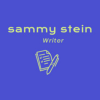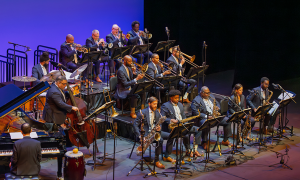Home » Jazz Articles » Live Review » People Band and Friends at Café Oto
People Band and Friends at Café Oto
Cafe Oto
London, England
28th October 2014
I knew when my friend turned to ask me, halfway through the event, "This is a bit extreme isn't it?" that I had baptized him with fire. He had never been to a jazz gig before, let alone a free improv set like this, where most of the People Band and also many of their associates came together in tribute to the life of a great jazz improviser and founding member of that band, Mel Davis. Davis was a mentor to many players, and an inspirational musician. He played piano, pipes, cello, percussion and a host of other instruments.
His recordings include Alchemy and the Third Ear Band's third album (Harvest 1969). Others are Loverly Play World Wide Music by various artists (ITM 1988), on which he composed and played piano and, Resonance Volume 8 Number 2/Volume 9 Number 1 LCM the first 25 years (London Musicians Collective 2000), Not Necessarily English Music (EMF 2001) and The People Band 69/70 (Transatlantic 1968, then re-mastered by Emanem in 2009). Tonight was a celebration of his life, exactly a year after his death.
Davis was closely associated with the young, freewheeling People Band in the late '60s, which started as a collection of musicians who wanted to play free music. They morphed out of a trio with pianist Russell Hardy, bassist Terry Holman and drummer Terry Day. They met with other similarly minded musicians at venues such as The Starting Gate pub and eventually formed The Continuous Music Ensemble. Out of this emerged the People Band's core members, but always with additional musicians joining them for a while, an hour, a set. The core remained Davis on piano, drummer Day from London Improvisers Orchestra, who also scored films such as Summer (1984, Channel 4), Charlie Hart (of Battered Ornaments, Ronnie Lane's Slim Chance) on bass, Sax players Paul Jolly, George Khan (Battered Ornaments, Kilburn and The High Roads, Robert Wyatt) and percussionist Tony Edwards (Big Chief).
The People Band have long been held in high regard by improvisers in Europe. They do not come together very often, largely due to the fact that the musicians are scattered across the UK and are busy with other projects. When they do perform, it is generally something of an occasion. They have inspired many players and remain one of the seminal free playing combos in the UK.
Davis' last performance was with the People Band at Café Oto, in March 2013, so it seemed fitting the celebration be held there. Band members called on the services of many of Mel's friends and associates, who came together for a night of free form music and reflection.
People chatted at the gig, recalling small events which impacted their musical lives. They spoke of Davis as being very approachable, with a desire to develop free music and inspire younger players. His home served as the venue for get-togethers and sessions as he encouraged others to play according to their hearts and feelings, and to keep pushing the improvisation and not give up. He was also a lover of animals who lived a rural existence with lots of wildlife around.
The gathering at Oto included (according to the program but impossible to check that night due to so many people taking the stage at different times) vocalist Maggie Nicols, bass and trumpet player Mike Figgis percussionist Edwards, guitarist Brian Godding, bassist Ollie Blanchflower, trumpet players Ben Higham and Jim Dvorak, pianist Russell Hardy, guitarist Ed Deane, saxophonist Dave Chambers. The artist Gina Southgate painted live images as the musicians played. Most performers handled several instruments, so assigning them one in particular is nominal.
The evening promised intrigue and interest and provided just that. There were up to twelve improvisers on stage at any one time. There were two, three, seven or a solo player, and extreme might just be one word for it. Another audience member described it as "Mental."
The performance opened with a number that built slowly to an almost deafening crescendo in the relatively small Café Oto space. Most musicians joined the others on stage for one collaboration and some stayed for the entire set—it depended. They wove in and out, added their ideas, sat and listened, interjected chords and vocals, manic interludes or fell silent. There was, it seemed, no decision making other than the mental processes and exchange of musical ideas which occurred from time to time. Sometimes the fact that it had been a very long time since many of these musicians had played together was apparent and there was a slightly uneven, stumbling feel to what unfurled. A few players dominated and a few remained on the sidelines. They, like their playing, had changed a lot since the late '60s when many first played with Davis. Some have perhaps become used to being centre stage rather than part of a large ensemble but they knew what they were doing. Eventually, they tuned into each other and something magical began to emerge. There began to be subconscious agreements, they began to sense who was coming in, out or supporting a solo, duet or whatever evolved and they gave each other space. Egos were put aside and the set developed with several free numbers—all nameless, all unrepeatable but all individual and created by the melding of the talents of these supreme free form players who, after a stumbling start, suddenly found the music, themselves and each other.
Figgis, who also directs films, showed a short feature he'd made about Davis, demonstrating improvisational piano and talking about free music. As he spoke, there was a sense of real conviction. Here was a man who firmly believed what he said and played how he felt. His musicianship was amazing. Sadly, the film was only about 8 minutes long. It was followed with a trumpet/sax duet, led by Figgis on trumpet. It was a slow, emotive piece and the audience fell almost silent. Davis, however, may not have approved because it was controlled and had such a definite form and structure you could not call it free music. Figgis even got a loud comment or two from fellow musicians off stage to that effect. Nevertheless, it was a moment of peaceful reflection after the film and worked at that moment.
The second set was an unbroken half hour or so of free, improvised playing by most of the musicians present. Some joined in all the time, others wandered on and off stage as they felt appropriate. The small space meant that it was almost impossible for all of them to play at once but there were duets, solos, trios; a variety of instruments appeared from nowhere and there were bangings, screeching vocals and whistles. A gorgeous flute solo soared over the top at one point and then faded, the player unclear among the mass of bodies on stage. Finally, the confidence and magic was back. These musicians had not played together for a long time (some of them had simply not played for a while) and coming together, losing the 'self' and remembering what it was like to play unfettered, yet structuring the music so it made sense, was hard at first and some dominated whilst others were happier playing in the background but finally, towards the end a sort of magic happened. The whole unit gelled and led to a finale which Davis would have approved of.
Each musician listening to each other in deep communication and playing free. Extreme? Maybe. Definitely mental, but a thoroughly enjoyable celebration of Davis' life provided by people he influenced and, most importantly, who loved him. Somewhere in heaven a piano is being lovingly played as musical convention is taken apart and somewhere an angel is singing (discordantly).
Tags
People Band
Live Reviews
Sammy Stein
United Kingdom
London
Mel Davis
Terry Day
Charlie Hart
Paul Jolly
Robert Wyatt
Maggie Nicols
Mike Figgis
Brian Godding
Jim Dvorak
PREVIOUS / NEXT
Support All About Jazz
 All About Jazz has been a pillar of jazz since 1995, championing it as an art form and, more importantly, supporting the musicians who make it. Our enduring commitment has made "AAJ" one of the most culturally important websites of its kind, read by hundreds of thousands of fans, musicians and industry figures every month.
All About Jazz has been a pillar of jazz since 1995, championing it as an art form and, more importantly, supporting the musicians who make it. Our enduring commitment has made "AAJ" one of the most culturally important websites of its kind, read by hundreds of thousands of fans, musicians and industry figures every month.

























